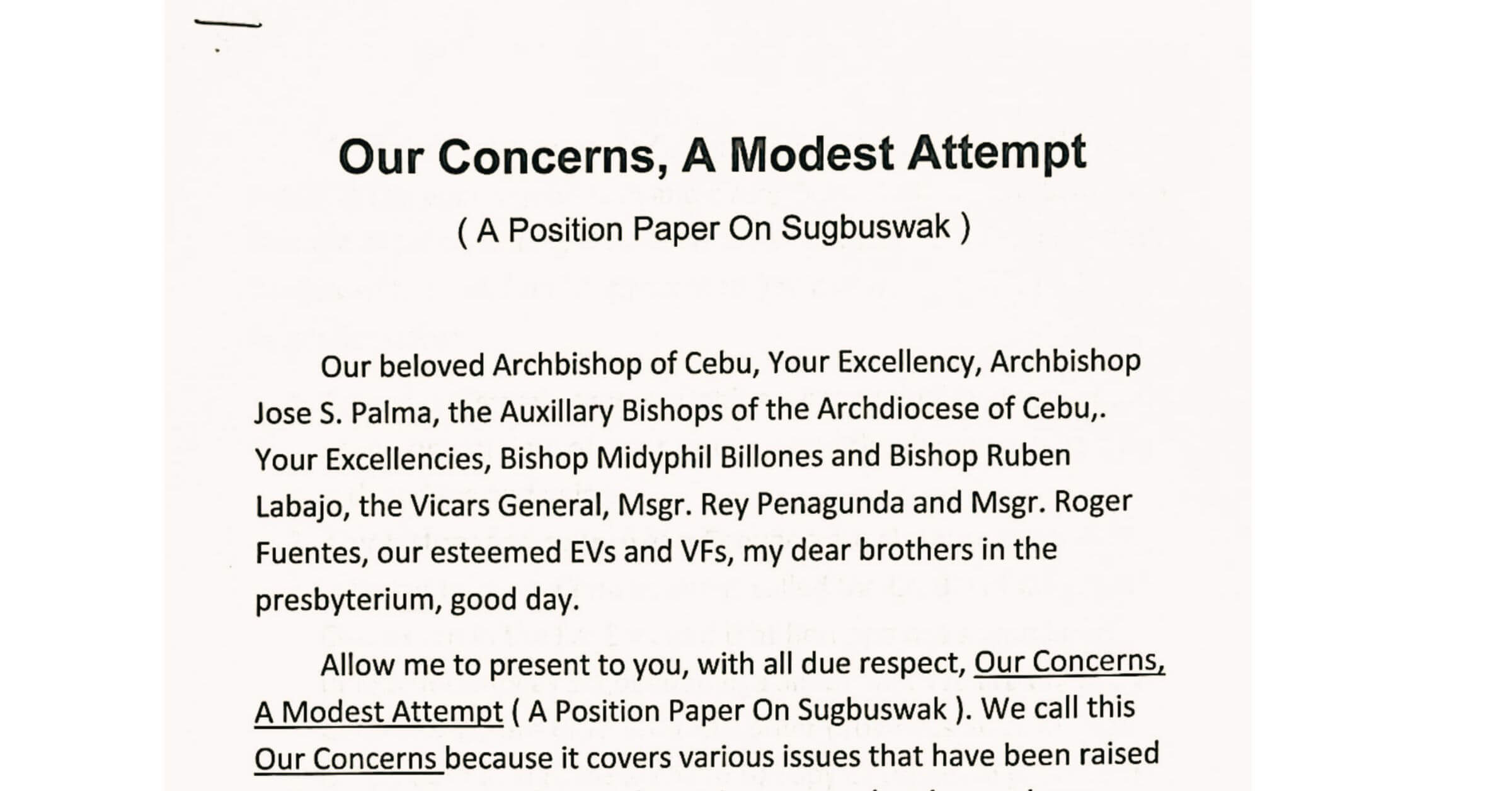The Archdiocese of Cebu will be split into three new territories: Archdiocese of Cebu-Central, Diocese of Cebu-North and Diocese of Cebu-South. During the Day of Prayer and Discernment on September 19, church officials presented the study on Sugbuswak, the name of the move to break up the archdiocese.
The move is, by several accounts, a “done deal” since it was ordered by the Vatican. But the details are a “work in progress” and nothing is final, Cebu Archbishop Jose S. Palma said during the clergy gathering last September 19.
In that gathering, Fr. Michael Raypan read a position paper on Sugbuswak. Raypan, according to Bag-ong Lungsoranon, is representative of the Upper Middle Clergy Group A, a group of priests with ages ranging from 50 to 55 years old.
Priests in other age groups, I was told, are also gathering the sentiments of its members with the goal of coming up with a position paper.
I’m blogging my coverage on Sugbuswak. The articles will be in this section. If you have tips or information you want to share with me, you can contact me on this page.
Here is the position paper read by Fr. Raypan and distributed during the clergy gathering.
Our Concerns, A Modest Attempt
(A Position Paper On Sugbuswak)
Our beloved Archbishop of Cebu, Your Excellency, Archbishop Jose S. Palma, the Auxillary Bishops of the Archdiocese of Cebu,. Your Excellencies, Bishop Midyphil Billones and Bishop Ruben Labajo, the Vicars General, Msgr. Rey Penagunda and Msgr. Roger Fuentes, our esteemed EVS and VFs, my dear brothers in the presbyterium, good day.
Allow me to present to you, with all due respect, Our Concerns, A Modest Attempt (A Position Paper On Sugbuswak ). We call this Our Concerns because it covers various issues that have been raised in formal and not so formal discussions across batches and age brackets. But we also call it A Modest Attempt because this is a statement of belief devoid of vanity, egotism, boastfulness or great pretensions.
Sugbuswak is consequential to the future of the Cebuano Clergy. When that happens a big part of our priesthood will never be the same again. Since such historic change will affect our hearts and minds then the same hearts and minds shall be able to participate in the process of making such a decision. If Sugbuswak has to be a product of Synodality then the spirit of participation has to animate our healthy polemics and discussions.
We are deeply concerned about Sugbuswak. And we believe that it is the yearning of each and every Cebuano Clergy to own such historic decision since it involves our life, our future, our priesthood.
In view of this, we humbly present to you our well-intentioned apprehensions:
- Are we not creating more problems because of Sugbuswak such as the uncertainty of our resources and the demographics that is dwindling and aging.
- Our history and culture as a Cebuano are closely connected with our religion. Cebu as one is called the Cradle of Christian Civilization in the Far East and that heritage has shaped our unique identity as Sugbuanon nga Simbahan. We are uniquely Cebu and we are different from other provinces and dioceses. On account of this, do we need to copy or replicate preceding divisions? The Archdiocese of Cebu is 500 years of history. She is a heritage that has stood the test of five centuries. If we are so careful about preserving edifices with historical value can we not give the same care and respect to the Archdiocese?
- The Archdiocese is a contiguous island and this geographic nature presents an inherent difficulty in dividing it as an archdiocese or even as a province. Such contiguity has greatly influenced even our language – we are one province, one archdiocese that speaks only one dialect, Cebuano. Unlike the island of Negros where the Orientals speak Visaya and the Occidentals Hiligaynon. Another case in point is the island of Leyte where the Southerners speak Visaya and the Northerners Waray-Waray. This contiguity has even influenced our deep sense of solidarity that in times of calamity what happens in one part affects the entire province. Dividing the Archdiocese, therefore, is like surgically separating conjoined twins who share one and the same beating heart.
- The proposed plan of dividing the Archdiocese of Cebu is not based on a significant increase of the number of Catholics and Clerics in the province. The Archdiocese has been able to effectively manage its current population. On the one hand, the increase in the number of parishioners and clerics shall be seen as a welcome blessing and shall not be regarded as an administrative nightmare. So we think that there is no compelling reason to divide or break up the Archdiocese.
- The Cebuano priest has never been inclined to migrate and serve other dioceses abroad. We stay in Cebu, serve Cebu and die in Cebu. By our ordination the mandate to serve the Archdiocese of Cebu characteristically follows. On account of this, the permanent transfer of a priest from one diocese to another goes through the process of incardination and excardination. Without pretending to be experts of Canon Law, we therefore, ask these honest questions: Does the division of the Archdiocese of Cebu involve the process of incardination and excardination? If so, does the need or the advantage of a priest’s particular church really require it? Are the provisions of law concerning the worthy support of the cleric observed? These are questions that stem from the conditions stipulated by Canon 269 on The Enrolment or Incardination of Clerics. In conjunction with these questions, the course of excardination also indicates that it “can only be lawfully granted for a just reason, such as the advantage of the Church or the good of the cleric” as qualified by Canon 270. So taking everything in mind, we humbly seek for enlightenment.
The process of understanding necessitates engagement. Hence, it is our prayer that we may be given ample time to reflect on the pros and cons of Sugbuswak. It is also our hope that a parallel study be made on the benefits and drawbacks of keeping the Archdiocese of Cebu as one Archdiocese. Allow us to have a free discussion in our districts and challenge us to ask the hard and difficult questions that the variables may be seen and understood. A decision such as this shall not be done in haste.
On December 7, 2022, during a general audience, Pope Francis received a gift, a golden crucifix, presented by Andriy Sadovy, the mayor of Lviv, a city in Ukraine. Embedded in that crucifix was a piece of shrapnel removed from a child injured in the Russian-Ukrainian War. And in that general auduience, Pope Francis spoke about making a good discernment. Among other things he said, “ Indeed, we have seen how time is a fundamental criterion for recognizing God’s voice amidst so many other voices. He alone is Lord of time: it is the hallmark of His originality, which differentiates Him from imitations that speak in His name without actually doing so. One of the distinctive signs of the good spirit is the fact that it communicates a peace that lasts in time. If you consider more profoundly, then make the decision and this gives you a peace that lasts through time, this is a good sign and indicates that the path was good. A peace that brings harmony, unity, fervor, zeal. You come out of the “deepening” process better than when you entered it.
A first aspect is whether the decision is seen as a possible sign of response to the Lord’s love and generosity toward me. It is not born out of fear, not born out of emotional blackmail or compulsion, but born out of gratitude for the good received, which moves the heart to live liberally in relationship with the Lord.”
Pope Francis continued, “We can only love in freedom, which is why the Lord created us free, free even to say no to Him. Offering Him what we hold most dear is in our best interest, enabling us to live it in the best possible way and in truth, as a gift He has given us, as a sign of His gratuitous goodness, knowing that our lives, as well as the whole of history, are in His benevolent hands. It is what the Bible calls the fear of God, that is, respect of God – not that God frightens me, but a respect, an indispensable condition for accepting the gift of Wisdom (cf. Sir.1:1-18). It is the fear that casts out all other fears, because it is oriented to Him who is Lord of all things. In His presence, nothing can disquiet us. It is the wondrous experience of St. Paul, which he expressed in this way: “I know how to be abased, and I know how to abound; in any and all circumstances I have learned the secret of facing plenty and hunger, abundance and want. I can do all things in Him who strengthens me” (Phil.4:12-13). This is the free man, who blesses the Lord both when good things come and when not-so-good things come: May he be blessed, and let us go forward.”
Pope Francis concluded, ” Recognizing this is critical to good decision-making, and it reassures us about what we cannot control or predict: health, the future, loved ones, our plans. What matters is that our trust is placed in the Lord f the universe, who loves us immensely and knows that we can build with Him something wonderful, something eternal. The lives of the saints shows us this in the most beautiful way. Let us go forward, always trying to make decisions in this way, in prayer and feeling what’s going on in our hearts, and going forward slowly. Have courage!”
Now we have spoken and for hearing us out, to our dear Archbishop Jose S. Palma we are eternally grateful.
Max is a journalist and blogger based in Cebu. He has written and edited for such publications as The Freeman, The Independent Post, Today, Sun.Star Cebu, Cebu Daily News, Philstar Life, and Rappler.
He is also a mobile app and web developer and co-founded InnoPub Media with his wife Marlen.


Leave a Reply